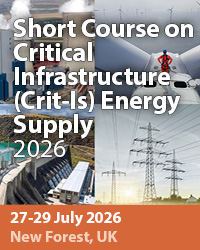
Short Course on Critical Infrastructure (Crit-Is) Energy Supply
Date of beginning
Monday, 27 July 2026Duration
3 daysDeadline for abstracts
Friday, 01 May 2026City
SouthamptonCountry
United KingdomContact
Jane ChantlerMemo
The objective of this course is to describe the critical role of energy systems in modern infrastructure. Water and food supply, transportation, governments, administrations, health, internet, communication channels, manufacturing of goods, banking and other sectors essentially depend on energy. Without energy, all these infrastructures cannot be operated. Hence, the energy sector is today’s most critical infrastructure. A failure in parts of the energy sector results in negative impact on other infrastructure systems - and may result in situations of disaster. Oil is still a key energy source for the world, however many countries are highly dependent on imports. In the 1970s, our planet experienced this slightly for the first time (OPEC supply reduction). Is it better today? What happens if a revolution takes place in Saudi Arabia or in Russia? Up to now, the UCTE, the Continental European electricity grid has been one of the most reliable grids in the world. Over the last three years, instabilities have been observed. Investigations uncovered that a break-down would result in war-like consequences for the population. Are there options to avoid such effects? The course provides deep insight into the whole energy system, how it works, the nature of risks and vulnerability. The reasons for potential failures are highlighted as well as the consequences of such incidents and the dramatic impacts on the civilized world. The course will also cover methods of reducing existing risks and provide security approaches as well as measures of mitigation. This course highlights the critical role of energy in our daily lives. Energy is essential for almost everything we rely on - without it, society would quickly regress to a pre-modern state. A lack of reliable energy means no ATMs, closed shops vulnerable to break-ins, halted subways and trains, disrupted telephone and mobile networks, non-operational gas stations, and no lighting in homes or on streets. Even hospitals can only function for a limited time without power before critical systems fail. And this is only part of the picture - the electricity grid itself is just one element of a much larger system. A real-world example of this vulnerability was the massive blackout in Spain and Portugal, which affected around 50 million people. During the outage, some individuals were trapped in elevators for over 20 hours, and tragically, several lost their lives due to extreme summer heat and the absence of rescue.

